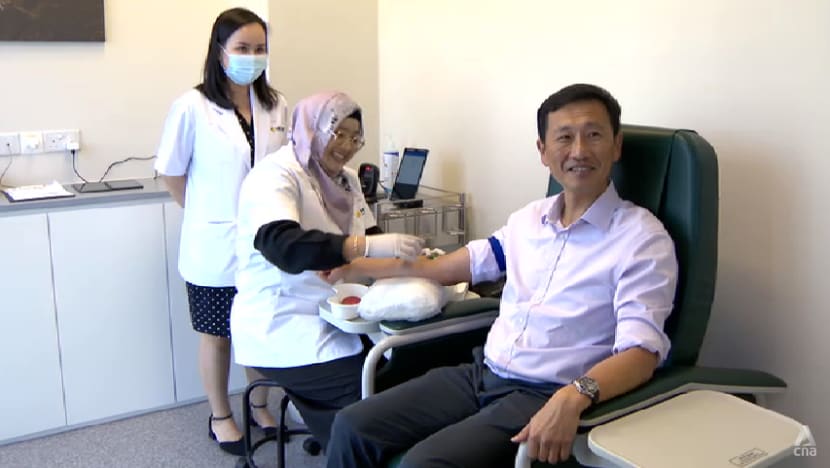30,000 Singaporeans, PRs wanted: Your DNA could be the key to pinpointing underlying causes of illnesses
Your height and weight, blood pressure and even your skin could hold the key to pinpointing underlying causes of illnesses and chronic diseases.

Health Minister Ong Ye Kung undergoes a health screening during the official launch of the SG100K research programme.
SINGAPORE: A research programme aims to map the DNA and the complete set of genomes of 100,000 Singaporeans and permanent residents. The information may hold the key to pinpointing underlying causes of illnesses and chronic diseases.
Researchers aim to use the data gathered from the SG100K study to identify risk factors and prevent or slow the progression of diseases, as well as create a customised approach to healthcare.
About 70,000 participants are already part of the project, and slots for 30,000 more are now open.
All Singaporeans and permanent residents of any ethnicity aged between 30 and 84 are welcome to join, including those with pre-existing conditions.
Participants will also get their own detailed health report at no charge.
SPECIFIC TO LOCAL DNA
Singapore faces a growing burden of long-term health conditions in its population, including diabetes, cardiovascular diseases, and other chronic conditions, said cardiovascular epidemiology professor John Chambers, the lead investigator of the SG100K study.
At the moment, approaches to dealing with those conditions are based on evidence developed by European and North American nations, which vastly different demographics may not be as accurate for Asians.
“Even something simple like what represents a normal thickness for a blood vessel differs across ages, across genders, between ethnic groups and between populations,” said Prof Chambers from the Nanyang Technological University’s Lee Kong Chian School of Medicine.
The research team said there is a need to develop Singapore’s own library of data for a more comprehensive study, so that more accurate and targeted approaches can be developed to deal with the specific issues within the local population.
Knowing the risks factors will help researchers develop diagnostic tests that can lead to early detection of certain diseases, allowing for targeted interventions and preventive medical care.
This will allow “vulnerable individuals to get the health interventions that they need early in their life, so that they avoid late consequences, and maintain health and productivity for many years”, said Prof Chambers.
PARTICIPANTS SIGN UP TO HELP FUTURE GENERATIONS
Most of the 70,000 people recruited so far are not new to research programmes – they have already been part of existing studies.
Some participants told CNA they signed up because they wanted to be part of an initiative that can help future generations of Singaporeans live better and healthier lives.
“I think being able to be a so-called ‘specimen’, to contribute the data and help future generations … as a person who has a daughter myself, I hope that it will benefit her and the generations to come,” said businessman JK Saravana, 41.
Another participant Norhayati Sukaimi, said: “What they get from my data will help others, to take care of them earlier, (because) prevention is better than cure.”
Apart from helping others, the 55-year-old homemaker said she found out through her report that her cholesterol levels were of concern.
Like others in the study who said they made changes to their lifestyle and food choices after receiving their test results, Mdm Norhayati has since cut down on oil and sugar while cooking, and reduced her snack intake.
The free health screening and test results that come with being part of the study are huge draw factors for many participants.
“You might have a lot of hidden illnesses, diseases that you do not know, some genetic traits that you didn't know. This test here, it gives you that peace of mind. And if (something’s wrong), at least it's caught early and you can remedy it much easier,” said Dr Kenneth Tong, 42, a veterinarian.
“The main thing is that it comes with a full report that you can discuss with the practitioner here or your private practitioner. You get such comprehensive test results in half a day and you are helping the Singapore population for it,” he added.
HEALTH MINISTER ONG IS A PARTICIPANT
One of the newest participants to be enrolled in the research was Health Minister Ong Ye Kung.
At the official launch of the study last Friday (Dec 16), Mr Ong called the project “the start of a major change in the healthcare landscape of Singapore”.
Mr Ong said that diversity is key in SG100K.
While nations such as the US, Britain, Denmark and Japan have initiated similar studies, SG100K took a multi-ethnic approach, involving population segments that may have been underrepresented in previous studies in other countries.
“This will give scientists a deeper understanding in an Asian context of the interactions between nature – the genome, and nurture – social and environmental conditions and factors,” said Mr Ong.
“This will enable and turbocharge the development of precision medicine,” he added.
On average, only one in four patients diagnosed with cancer or Alzheimer's disease respond to medicine that is currently available. For other common diseases like diabetes, or conditions such as irregular heartbeat and asthma, the corresponding level is in the range of 50 per cent to 75 per cent, said Mr Ong.
“This means that while patients may be given the same treatment, not all will experience the same expected benefits,” the health minister explained.
“This is because every human being is different, we all have different blueprints. Precision medicine allows physicians to move beyond this one-size-fits-all approach to medication and treatment,” he added.
With the study, physicians may soon be able to tell which drugs work better with particular patients according to their genetic characteristics, and be able to administer more targeted treatment.
In the same way, clinicians will be able to avoid drugs that may lead to severe side effects for patients, just by looking at their genetic makeup.
“Human beings are always determined to march forward … to embrace scientific advancement for the benefit of present and future generations,” Mr Ong said during the launch, where he underwent a health screening and had his DNA samples collected.
“SG100K represents such a step forward to help us learn more to improve and seek answers in Singapore.”
















